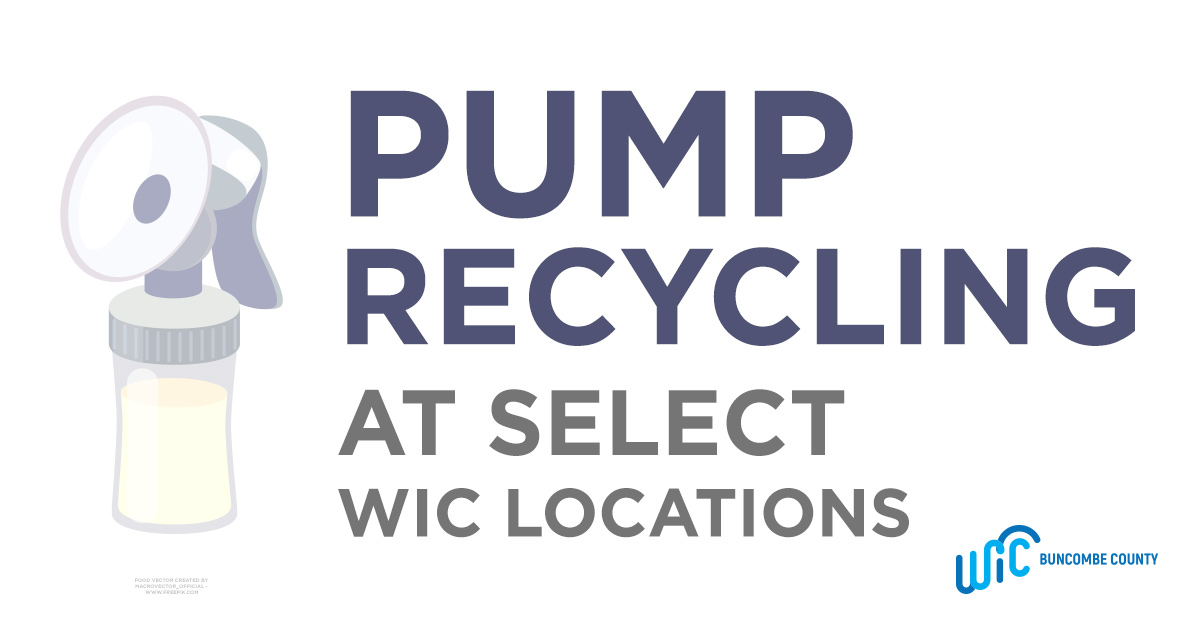This news item expired on Monday, August 31, 2020 so the information below could be outdated or incorrect.

From HHS:
Pump Recycling at select WIC Locations- 8/1-8/31
To celebrate World Breastfeeding Week- Breastfeed for a Healthier Planet, Buncombe County WIC staff are hosting a pump recycling event! During the month of August, we will be accepting ALL used/unwanted and personally owned electric pumps, manual pumps and any pump parts from anyone in the community. By doing this, we ensure that pumps are disposed of and recycled properly for the health of our community and planet.
The drop-off locations with be at 40 Coxe Ave. Asheville, NC 28801 and 339 New Leicester Hwy. Asheville, NC 28806.
Please put pumps/parts in a plastic bag and take to the location of your choice. When you arrive, call (828) 250-5000 and we will come out to get it from you.
Support Breastfeeding for a Healthier Planet
For years, breastfeeding promotion and support has been a pillar of the National Women, Infant, and Children (WIC) program and has been a strength of our local WIC program here in Buncombe County. Buncombe County WIC staff have created comprehensive outreach strategies and programs that make breastfeeding accessible, convenient, and possible for many mothers in our communities. Their efforts have resulted in an increase in local breastfeeding rates, improved maternal and infant health, and have improved the health of the mountains we call home.
About WBW
World Breastfeeding Week is a campaign run by the World Alliance for Breastfeeding Action (WABA) to increase breastfeeding rates across the globe by bringing attention to the intersections between breastfeeding and global themes. This year, we will look at breastfeeding and its impact on the environment and climate change.
Breastfeeding Is Environmentally Safe
There are many beneficial factors to breastfeeding for mothers, babies, and even the environment. Not only is breastmilk full of nutrients babies need to develop healthy bodies and immune systems, it is also natural and renewable. Producing breastmilk is something that a mother’s body typically does naturally- without any processing or the release of environmentally damaging bi-products. Formula is a lifesaver for many mothers who are unable to breastfeed but it requires multi-step processing which releases pollutants and drains natural resources like water and clean air. In fact, it is estimated that over 4,000 liters of water are needed to produce 1 kg of breast milk substitute powder.
Breastmilk Is Zero Waste
Breastfeeding also eliminates the need for packaging- making it a zero waste way to provide infant nutrition. Production and packaging of breastmilk alternatives requires continual use of natural resources; but the effects of this type of production outlive the product itself. Packaging can sit in landfills for years before decomposing, emitting harmful greenhouse gas which accelerates global warming. Breastfeeding, on the other hand, makes it possible to deliver infants the nutrition they need without any of these harmful environmental effects.
Increasing breastfeeding rates locally and across the globe is a powerful way to reduce pollution and conserve our natural resources. While breastmilk alternatives are a vital part of infant nutrition, they should only be used if a mother is unable to breastfeed. When these products are used in mass, the impacts are devastating on our environment. Breastfeeding is the healthies source of nutrition for infants and protects our communities and environment from harmful pollutants, damaging bi-products, and waste.
Support breastfeeding in Buncombe County by recycling your pump. The drop-off locations with be at 40 Coxe Ave. Asheville, NC 28801 and 339 New Leicester Hwy. Asheville, NC 28806.
Please put pumps/parts in a plastic bag and take to the location of your choice. When you arrive, call (828) 250-5000 and we will come out to get it from you.